Gold for Azzano and Matthias as the weather gods shine on race day.
Olsztyn greeted athletes from all over Europe (and a bit further afield) with rain, rain and more rain and then a bit of fog at the start. With a close eye on the water and air temperatures, the Technical Delegate was able to announce that although cold, the water and air was OK for the Sprint Distance races to go ahead and so, the 2019 Olsztyn European Cup and Junior European Cup was, “all systems go!”
It was the juniors who raced first and the Elite, benefiting from the late sunset, who raced in the late afternoon and early evening.
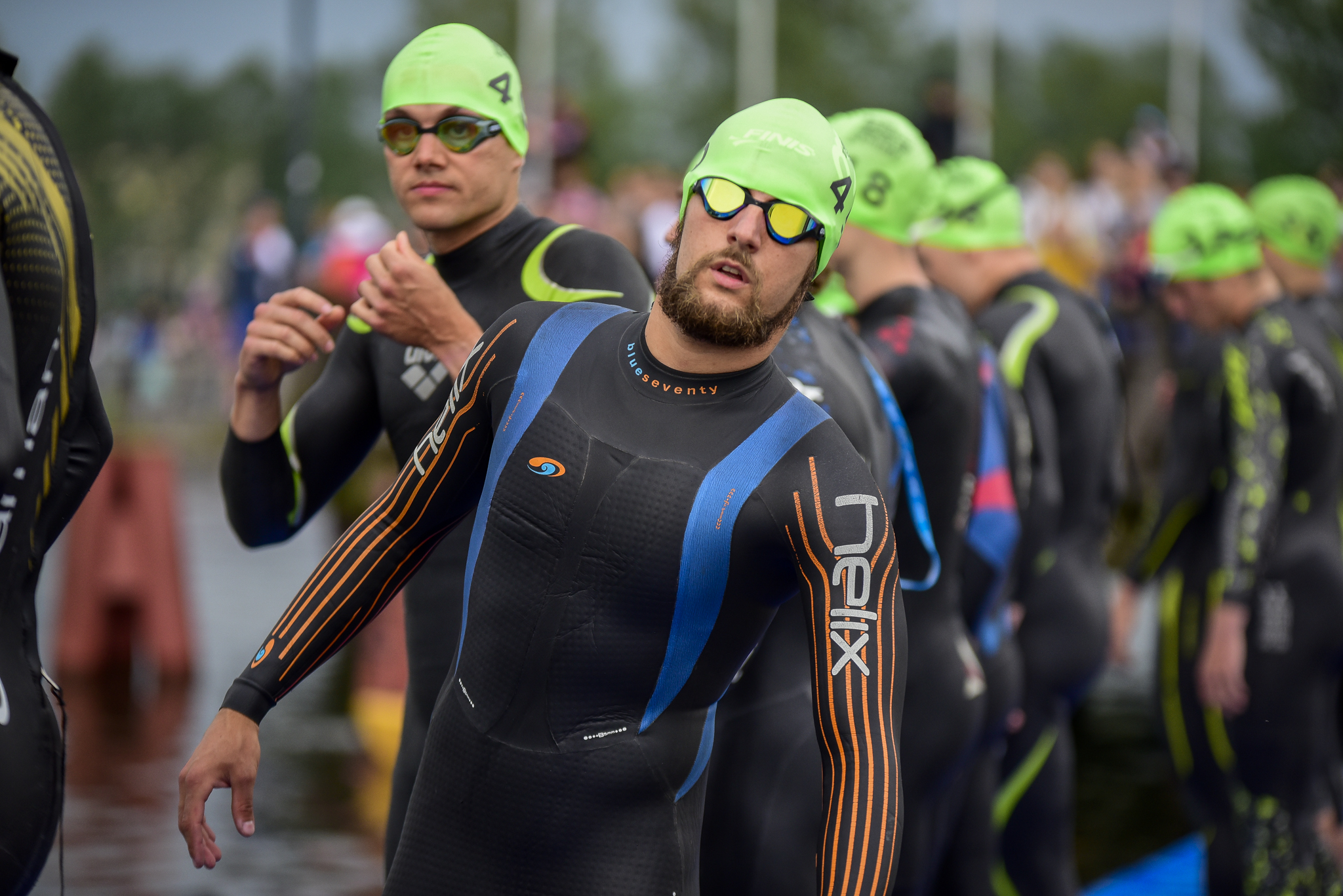
The men’s race drew huge crowds and for many there, the one to watch out for was Poland’s Michał Oliwa. Certainly the strongest swimmer, he was to face an early challenge from Simon Westermann SUI. As they reached the turn buoy, the pair were locked together and were pulling along a whole train of other athletes.
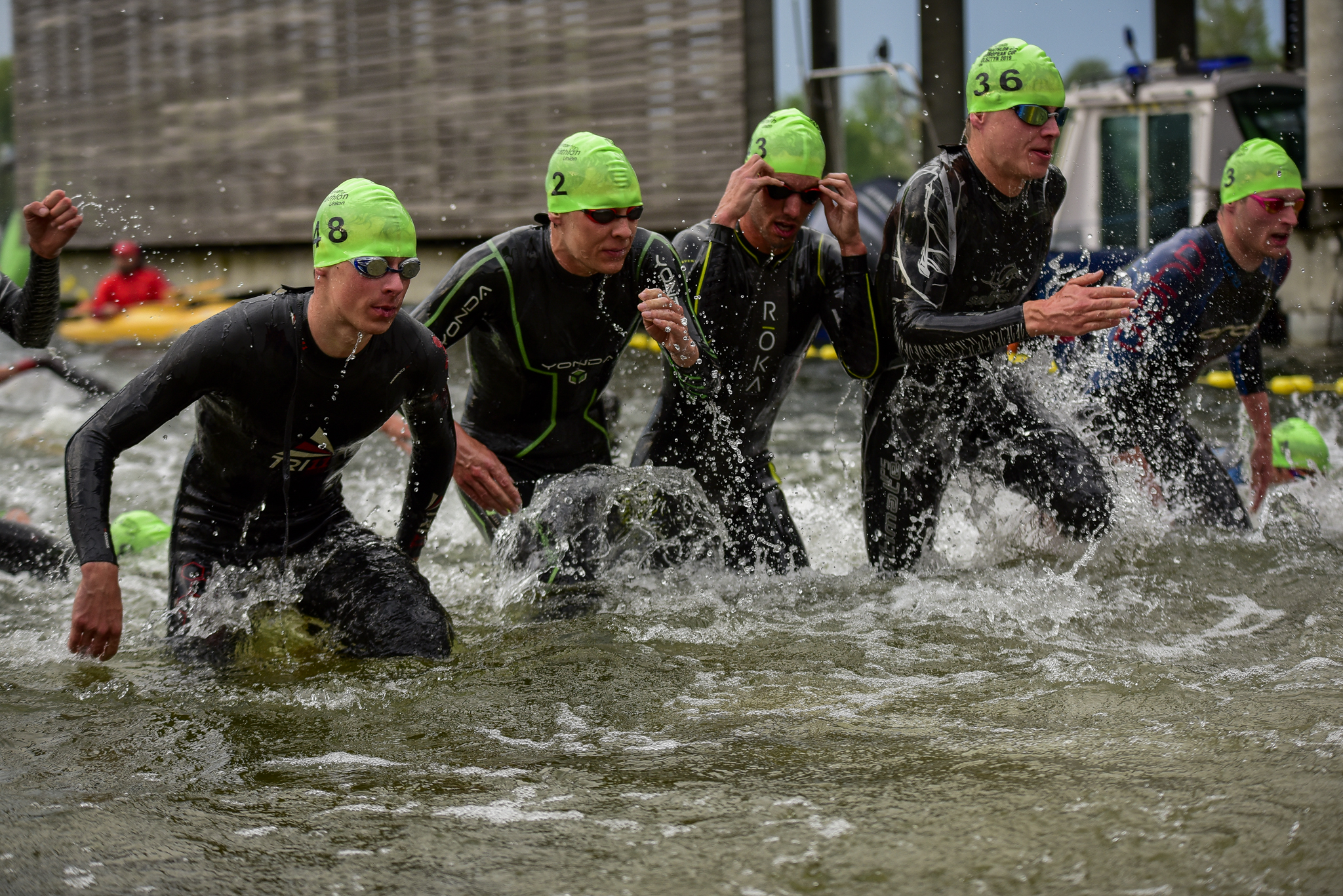
As they neared the swim exit, it looked almost certain that the expected break in the swim had failed and that the rush through T1 would deliver a large group out onto the testing bike course.
In the final metres of the swim, Oliwa dug deep, using his powerful shoulders and supreme swim style, and created a small leading advantage and then, using the long run along the blue carpet, made it easily into transition.
It was time for frantic action as the athletes tried to rid themselves of their wetsuits as quickly as possible so as not to miss the train. Oliwa and Westermann broke free and, shouting encouragement to each other, put the power on. Taking turns at the front in text-book chain-gang style, the chase group of 8 tried to get its act together and attack and soon enough the combined rolling power of the bigger group caught the early race leaders on the still wet, still potentially slippery roads.
As some athletes struggled to get their feet into their shoes, it was GB’s James Teagle who moved to the front and upped the speed.
The group had grown and, just as last year, it was the dead turns that were critical, with the bikers at the front powering away from the turn as others struggled in the pack to stay upright as the 180 degree turn was made.
The peloton had grown and with the slippery roads, this could turn out to be a real lottery.
The course design here in Olsztyn is really impressive and the chicane as they complete each lap and go through Transition was a focal point for the cheering spectators.
With one lap successfully completed and thee to go, the athletes were now familiar with the course and knew who, within the group, was strong.
As the sunshine came out, the peloton seemed to slow down and bunch. This proved to be bad news at the dead turn as the slick road surface claimed its first casualty. With one athlete down on the very edge of the turn and others trying to find a way through a gap that did not exist, it was a chance for a brief escape and Spain’s Carlos Oliver Vives led the breakaway but this was a short-lived lead.
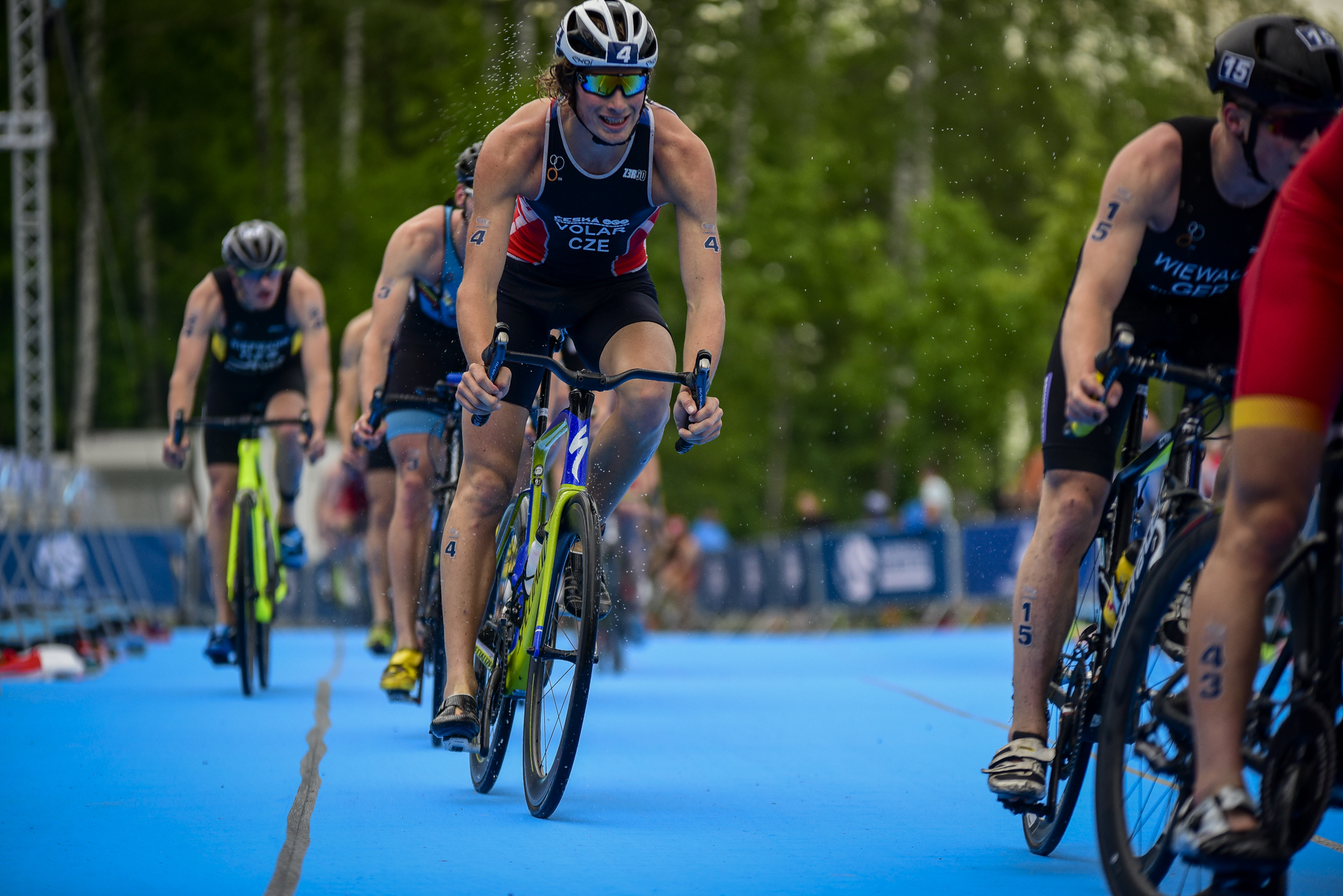
The crash did thin out the leading group but with more dead turns ahead, they all knew now that extra caution was needed. Slovenia’s Matevž Planko and the tall powerful Czech, Jan Volár did their best to break away but could not escape the great power of the pack.
The bunching of the athletes in this leading pack was now taking some of them across the road into the on-coming course as they fought to avoid a touch of wheels that could bring them down in a race-finishing crash. Thankfully, this happened without any other athletes coming towards them on the other carriageway but is not good form and with the live TV coverage, easy to spot. Indeed as the athletes entered the final lap, it seemed that there were some in the peloton who simply could not be bothered to stick to the course and repeatedly took a line that was shorter and which, on the opposite side of the course, was reckless. Perhaps their coaches, watching the coverage, might like to remind them of the rules about leaving the course.
With no real escape taking place it was now pretty evident that the final 5k run would be where the race would be decided. Oliwa was spending a lot of time at the front and Noah Servais BEL had raced cautiously.
With half a lap to go, the tempo seemed to increase as the athletes realised that to be at the back as they entered T2 would signal a lost opportunity. The Polish crowds were rewarded with a Polish athlete Tomasz Brembor leading them into T2 but it was Tim Siepmann and Lars Pfeifer for Germany leading them out with another athlete whose uniform was simply impossible to identify.
Pfeifer looked strong. Spain’s Oliver was close by. Tucked in behind Pfeifer was Italy’s Nicola Azzano. 10th here last year, he knew the run course well enough but could he keep up with Pfeifer who was striding away from them in the opening stages of this run?
In the chasing group, it was Servais doing the work and trying to bridge the gap. Oliwa was blowing hard but still pushing hard. Back at the front and Pfeifer’s early surge had been matched by Azzano and the group of 5 had reformed. As they ran up the incline to the turn point the second group upped the pace, taking advantage of the slight downhill section.
Suddenly, Pfeifer’s lead and chance of a medal looked lost. Teagle, cutting inside the cones to pass the group, moved to the lead and the pace increased. Azzano, Oliver and Westermann responded and carried the whole group forwards. Teagle was leading them as they completed the first lap but Azzano was now poised on his shoulder, with Pfeifer and Servais as company.
10 in the lead group would fight for just three medals over the final lap.
Pfeifer went back to the lead, dragging Azzano and Teagle along and as they hit the dead turn it was down to just five athletes; Pfeifer, Azzano, Teagle, Servais and Westermann.
Teagle was doing all the work at the front. Azzano was directly behind the Brit, running next to Pfeifer. Westermann was on the German’s heels and Servais sensibly held position in the sheltered position behind.
At the final turn out on the road it was pretty certain that the medals would come to this leading group and it was Azzano who visibly upped the pace. Servais moved up to sit behind the Italian just ahead of Pfeifer. Teagle stayed ahead of Westermann.
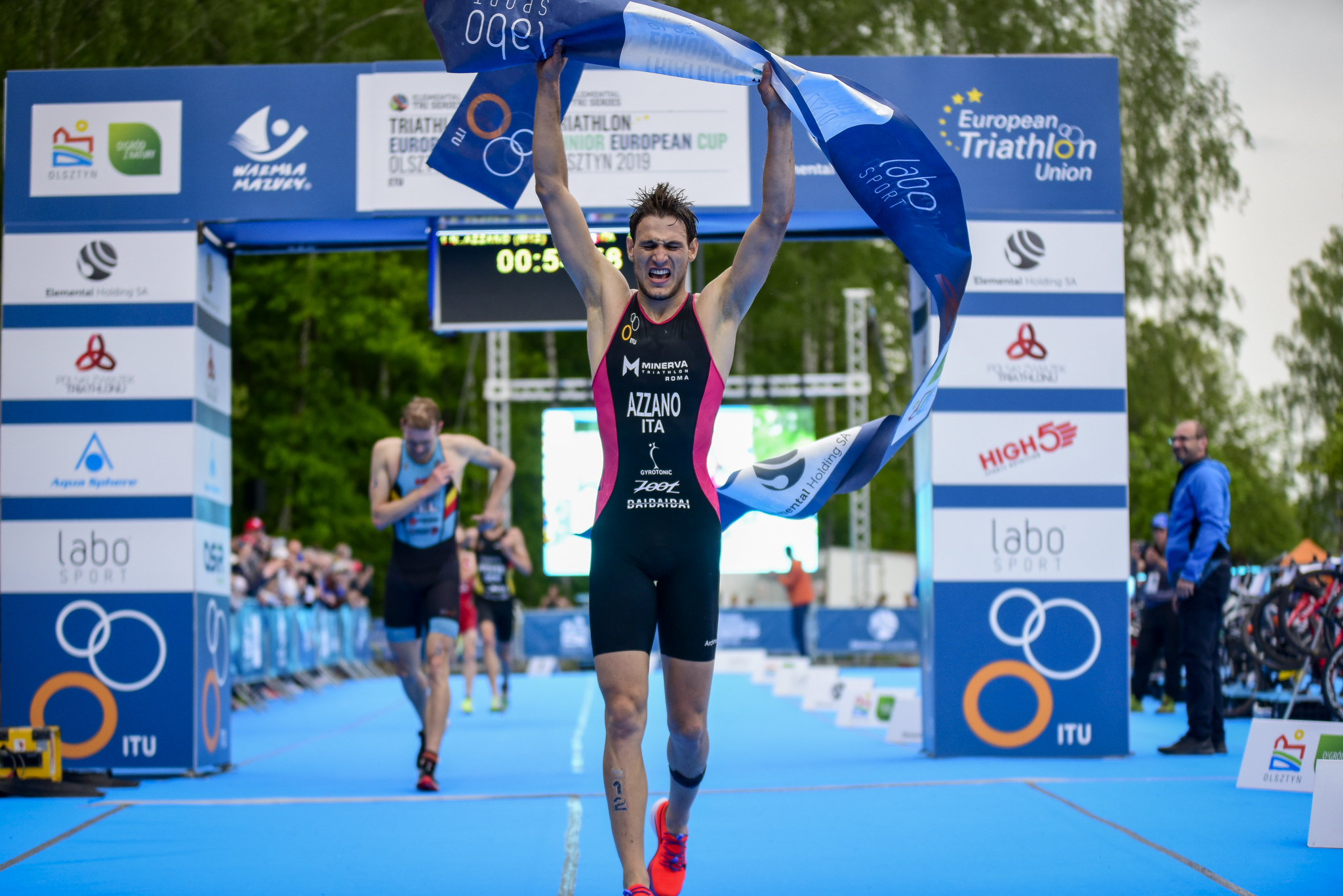
In the final stages of the run, it was Azzano who just had the pace to take the finish tape, with a hugely disappointed Servais in silver medal position. Pfeifer had done enough to claim the final medal.
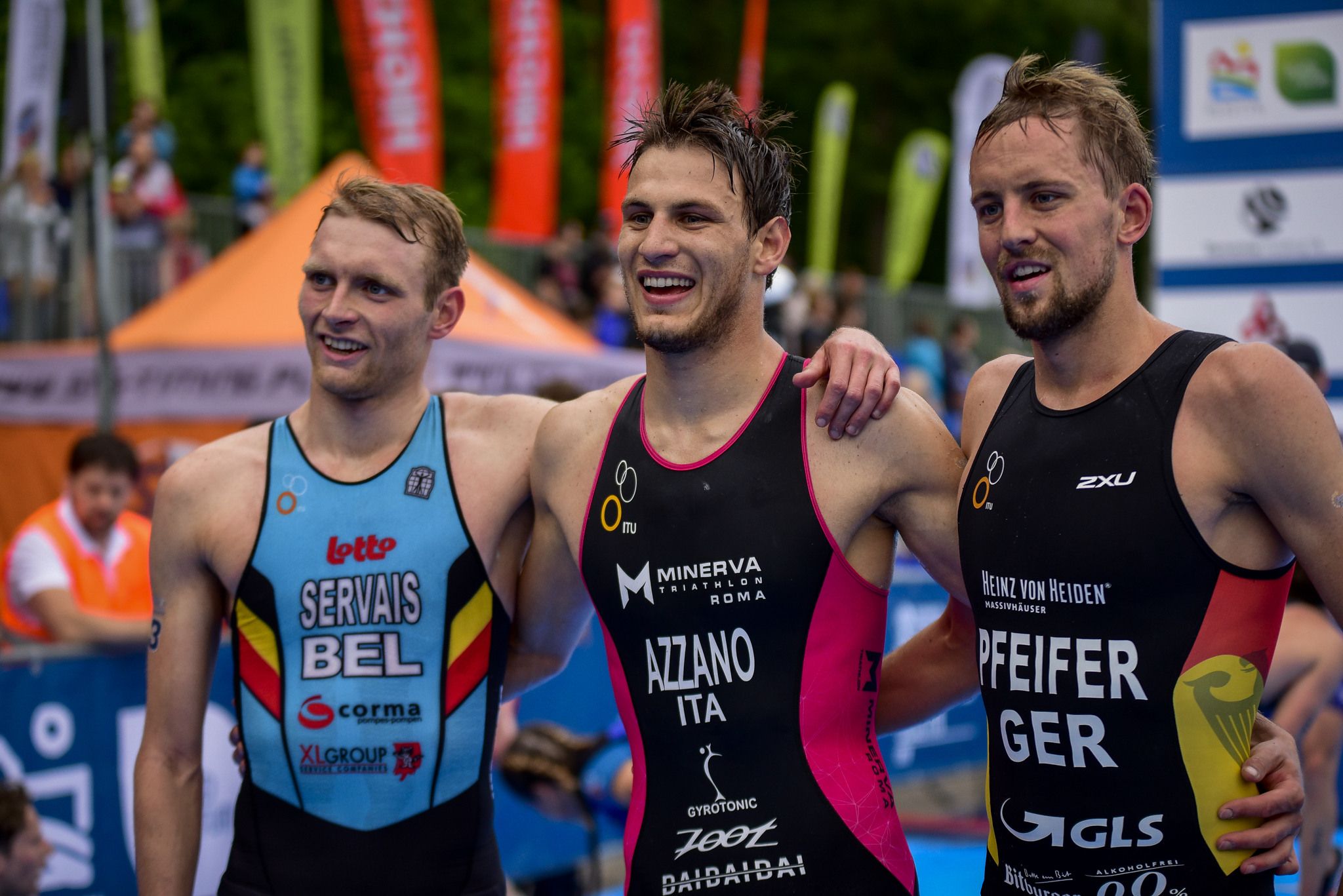
An exciting race but one that may well be studied in the days to come with regard to the behaviour out on the bike course.
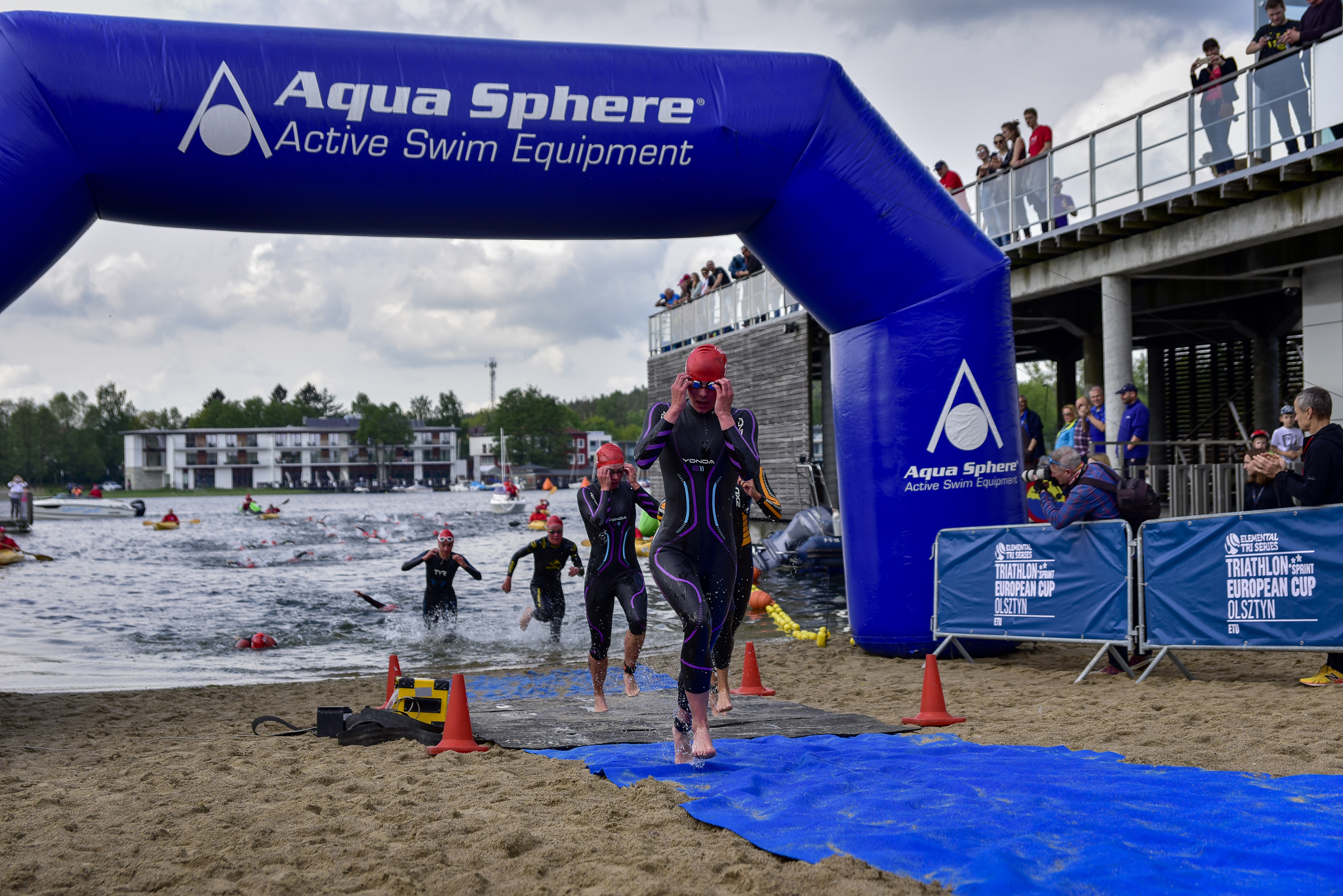
For the Elite Women, the swim was a gift for Olivia Matthias and Sophie Alden, the two British athletes. With excellent timing and with Russia’s Diana Isakova alongside, it was three athletes who had a small but important lead over Alicia Ulatowska and Carlotta Bonacina who later pulled out of the race.
The three leaders gave us a synchronised, stroke for stroke swim to the exit and it was Matthias who led them to the bikes, with the sun now providing some welcome warmth. Dorka Putnóczki HUN, had been just a couple of seconds away from the feet of Ulatowska and did her best to try and catch the British-Russian-Italian leading group but her attack was soon swallowed up by those behind her and it was then that Italy’s Carlotta Missaglia had the chance to show her power on two wheels. The Italian was over 30 seconds down on the swim, but with the fastest T1 of the race, had suddenly put herself back in contention.
Nine athletes working hard but with the leaders ahead, the chase was on.
The leaders hit the dead turn about 12 ahead of the chase pack. Bonacina, Ulatowska, Matthias and Alden were getting the chain-gang sorted, after a bit of encouragement from the Polish athlete. At the end of the first lap the four were looking good, but Bonacina looked uncomfortable.
The two Brits surged forwards as they sped through transition, to create a small lead. The chase pack, led by Missaglia, were now 27 seconds adrift. The lead pack was now down to just three and they showed no signs of slowing down, as each athlete took their turn at the front. Bonacina disappeared into the pack.
The chase group had made up time and cut 6 seconds off the lead. On this technical course, the athletes have plenty of opportunity to assess their lead, or to see what they might have to do to catch the leaders and with the dry conditions, the course was perfect for powerful cycling.
Keeping the lead at just over 20 seconds, the 8-strong was working well to try and reduce the advantage, knowing that Matthias and Alden can run hard off the bike and that Ulatowska had the home advantage and the crowds behind her.
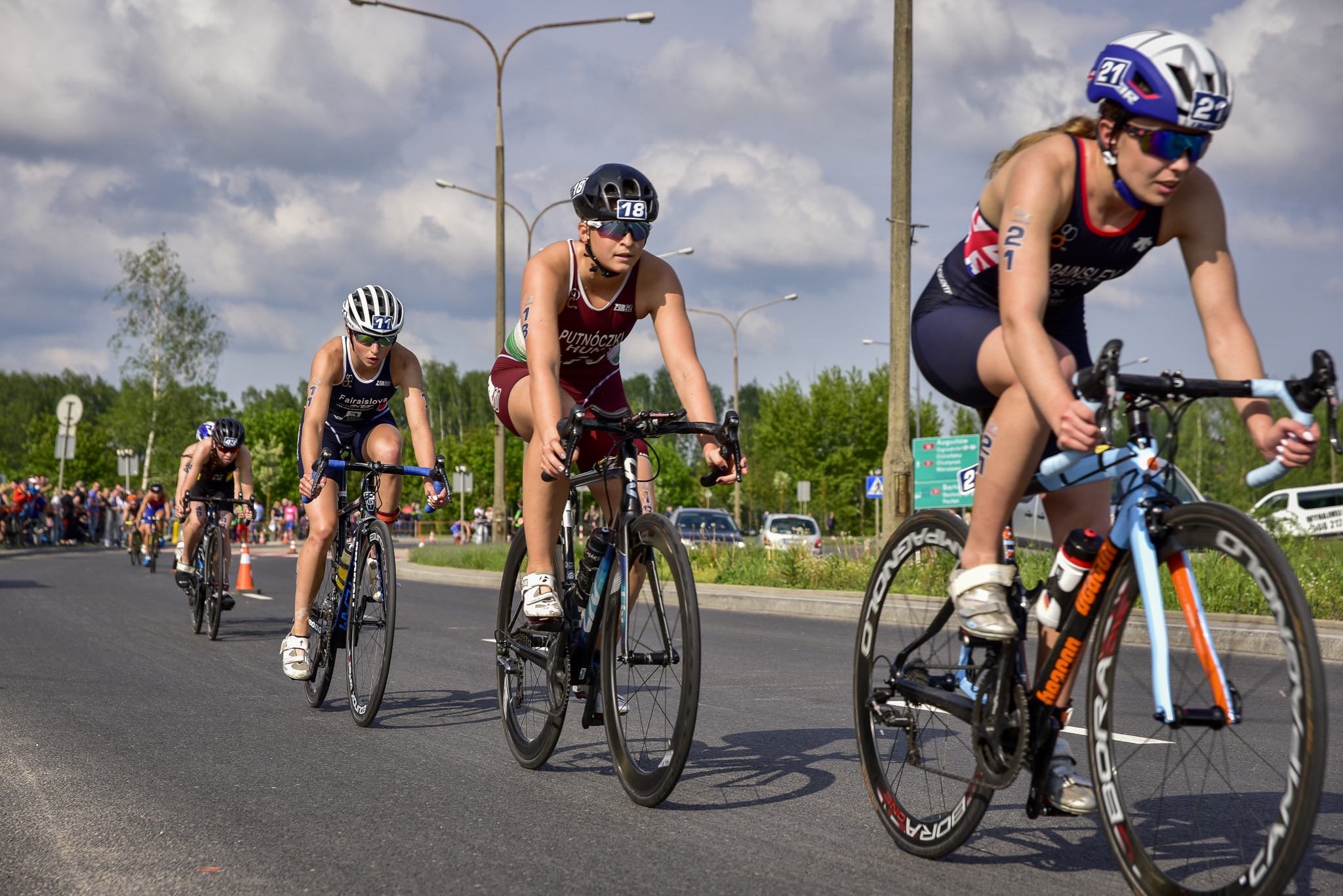
Nuyes, Missaglia, Noam Fishman ISR, Putnóczki and Britain’s Sian Rainsley were doing their best to supercharge the pack and as Ulatowska attacked on the carpet as the athletes started the bell lap, it was clear that the chase group had indeed started to catch up. Ulatowska’s attack was well-timed and as Matthias followed her, Alden was dropped and had to work hard out on the highway to re-join the lead.
Belgium’s Kiara Lenaertz took her turn at the front as the chasing athletes locked sight onto the leaders. The lead was down to less than 20 seconds and the leaders were now checking over their shoulders to see where the threat was. At the dead turn the lead was now only 8 seconds.
The leaders had done just enough to ensure a clear run into T2 and it was the delighted shouts of the Polish crowds, it was Ulatowska who led the two Brits to the bike racks.
Drama, as Alden slipped and fell just at her racking position and now she could hear and see the chasing group behind her. Missaglia was flying, Lenaertz was a flash of blue uniform too. The chase was on.
Ulatowska led, Matthias chased and caught the Polish athlete and eased ahead. Missaglia had caught Alden and those chasing could see nothing g but the tall figure of Matthias striding out in front.
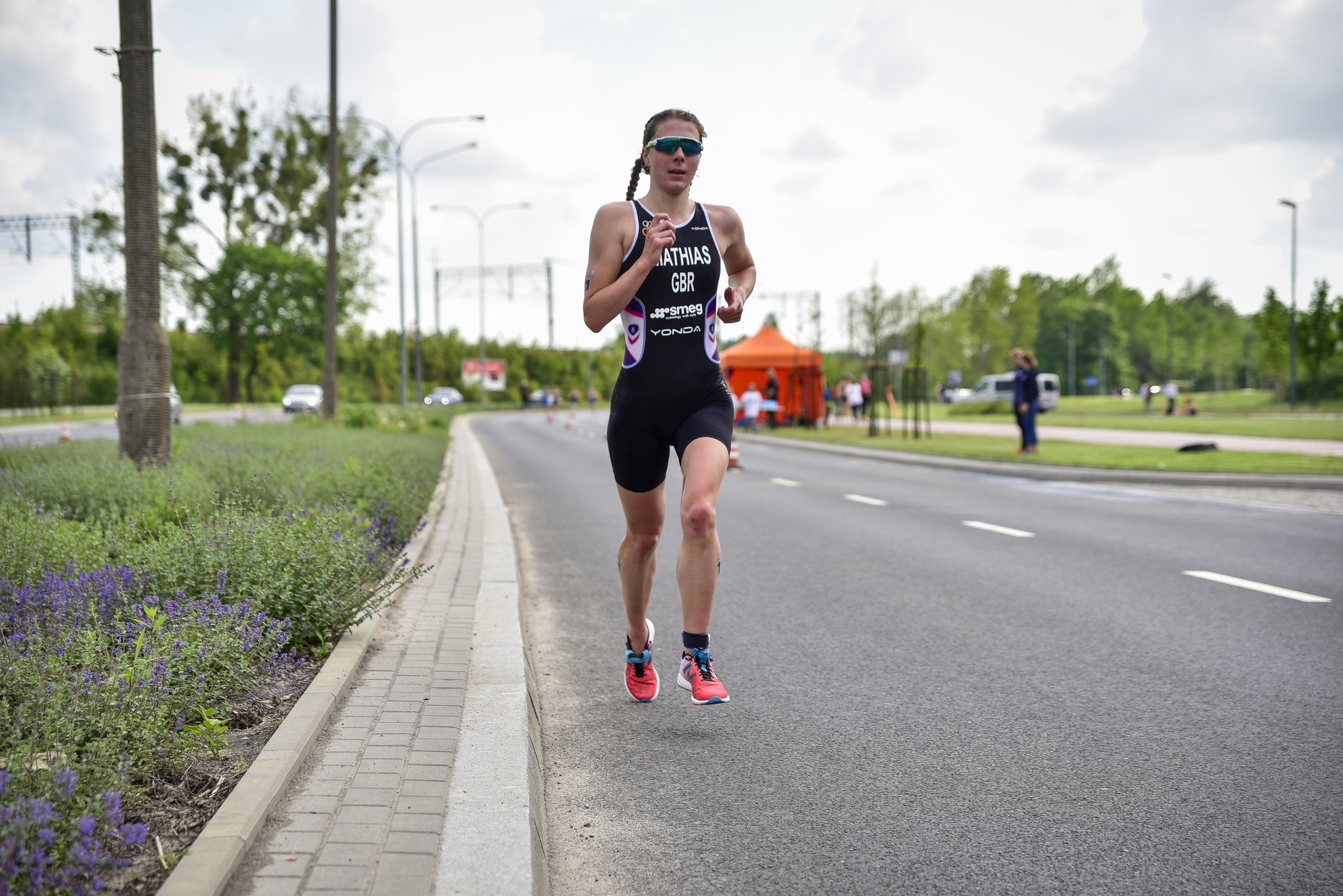
Alden’s stumble had cost her badly. Now behind the Italian, behind the Belgian and behind the Czech athlete Iveta Fairaislová, it looked like her medal chance had been snatched from her but with her Quarteira bronze still fresh in her mind, she knew not to give up.
Matthias out in front looked relaxed. Ulatowska was caught by Missaglia but the crowds were also now cheering on Marta Łagownik who was now showing her true running style and overtaking one by one those who had been ahead of her.
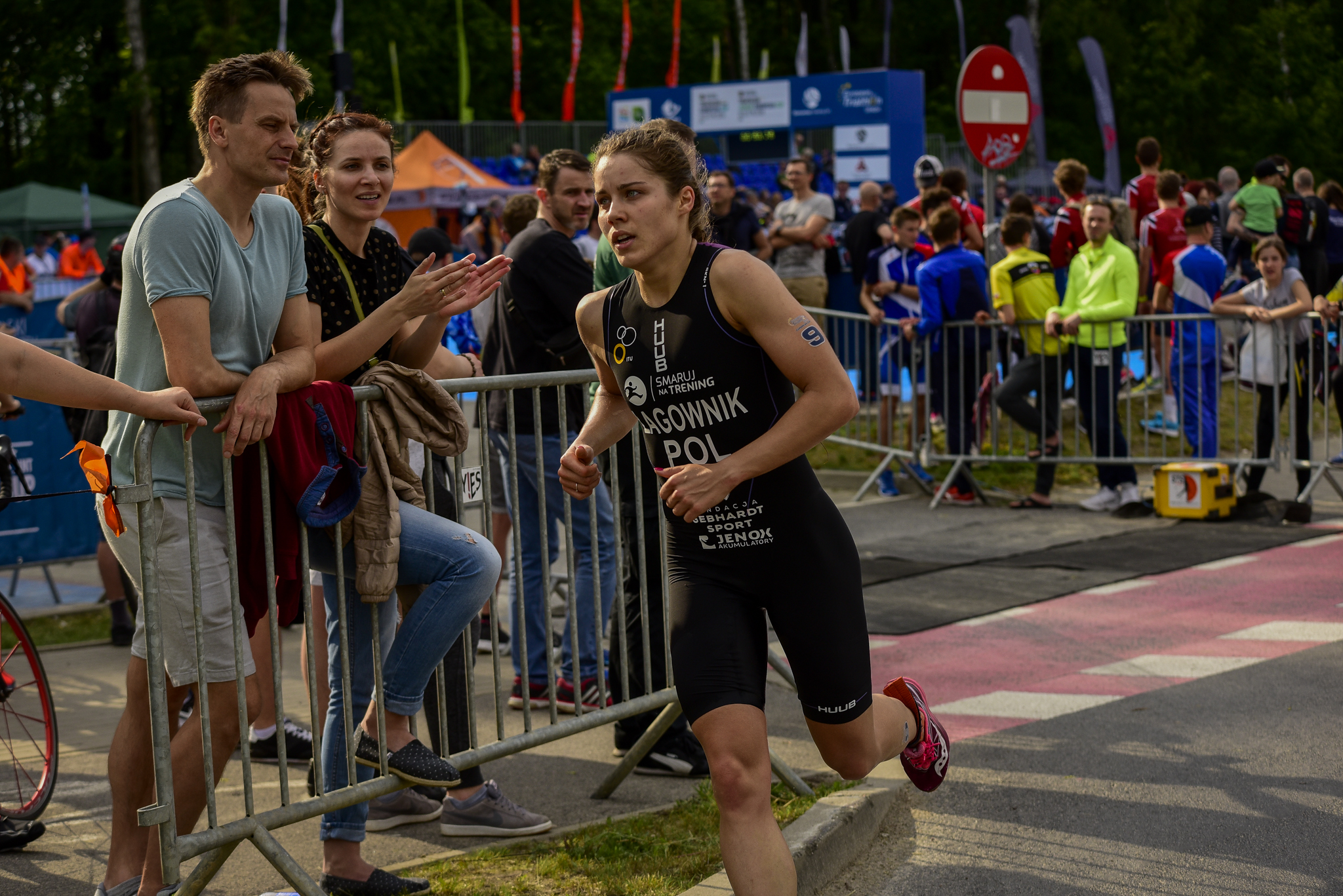
Matthias heard the bell and took on water for the final lap. Still leading; still looking strong. Missaglia had now left the comfort of the chase pack, which contained Lenaertz, Alden and Ulatowska and was focussed on the gap between her and the British leader.
As she neared the race venue and with the finish gantry in sight, Matthias must have known that victory was hers. She had read the race perfectly, had swim, biked and run in text-book style.
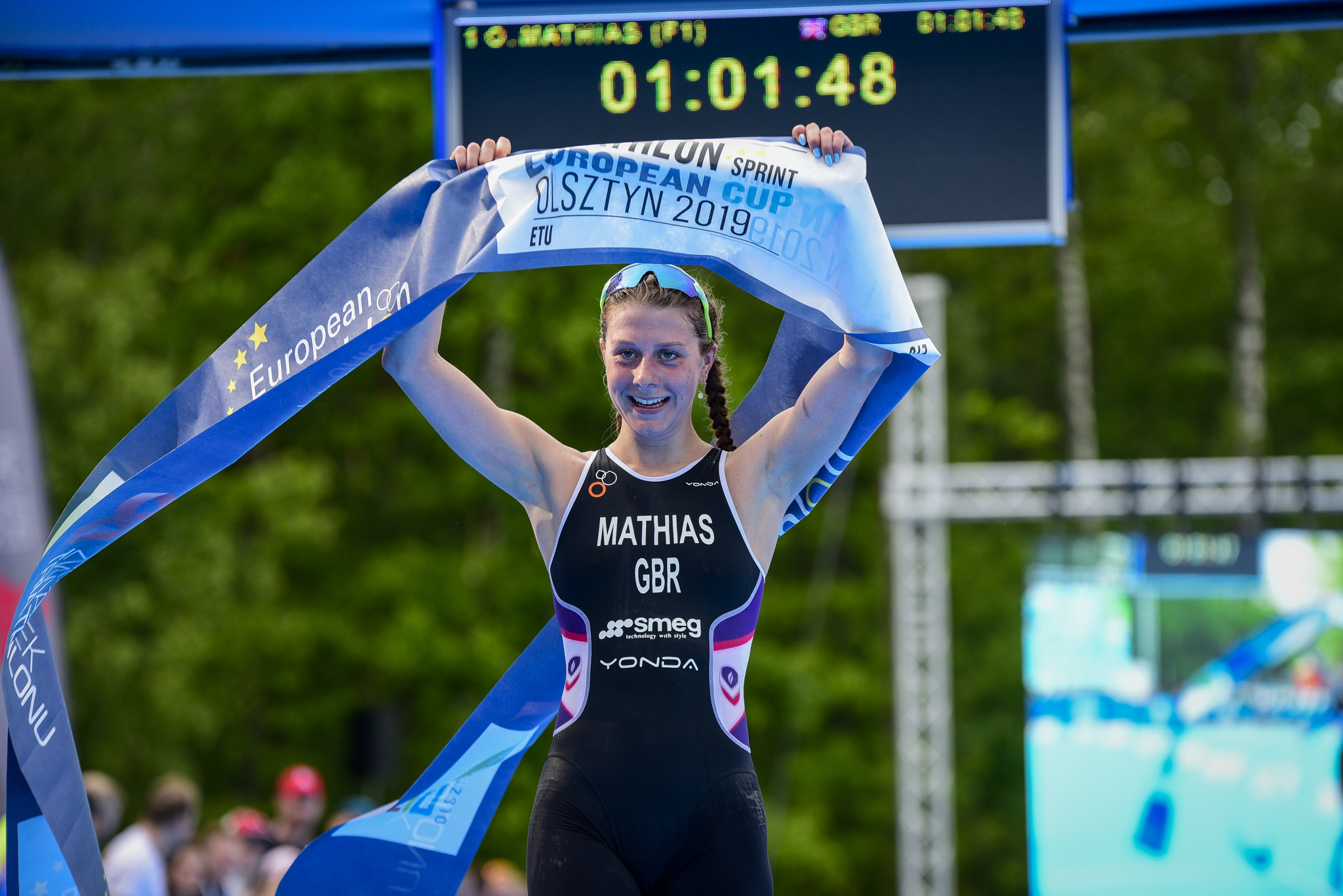
Crossing the line comfortably ahead, she was able to ease up just a little to enjoy the moment of glory. Missaglia had run well and just held off a late attack from Alden to take silver. Alden’s pace kept her on the podium, despite the best efforts of Lenaertz, who just missed out.
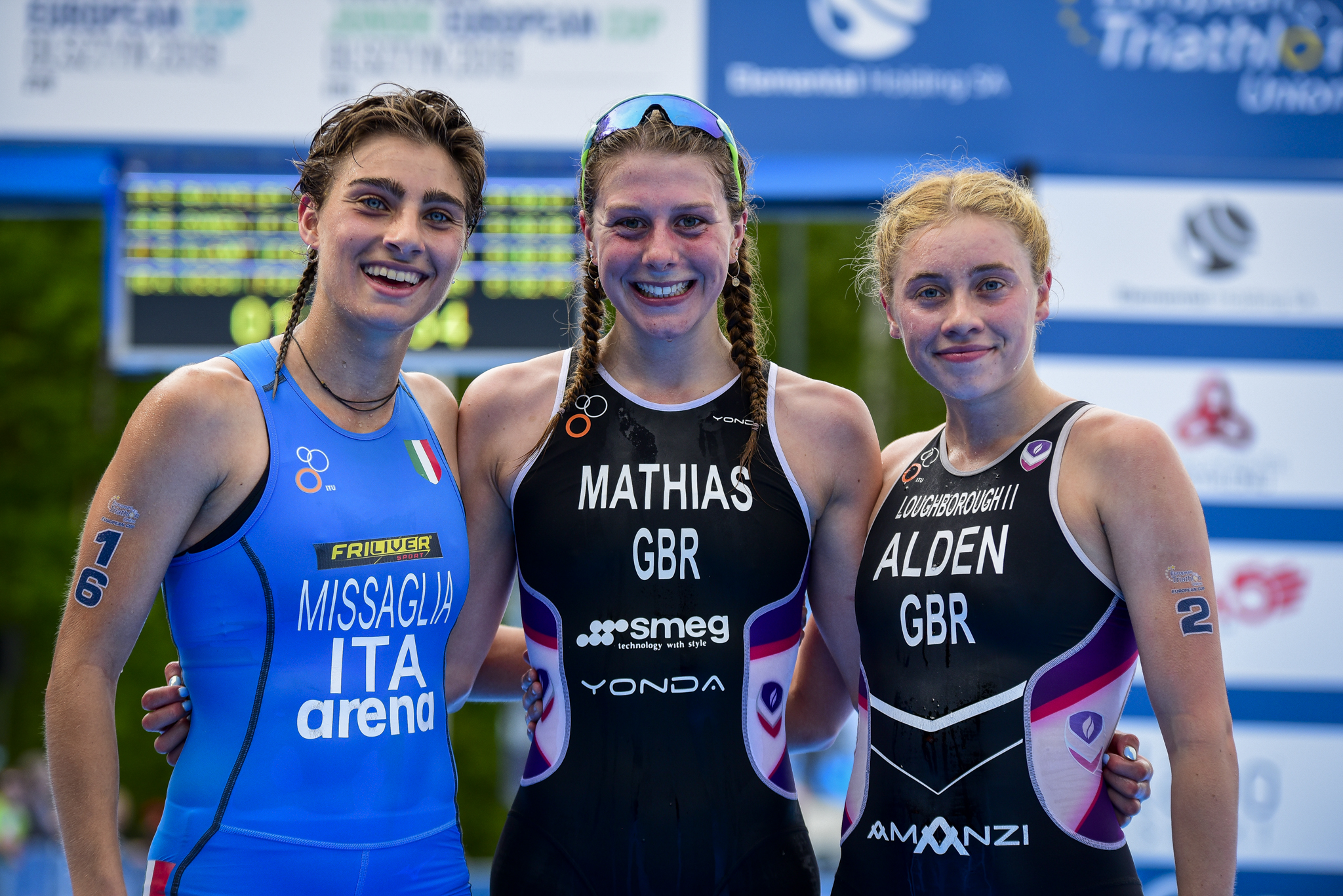
A truly great day for the young British athletes and for Missaglia a true test that showed her form is as strong now as ever. The Polish fans were rewarded with two athletes in the top ten, as Ulatowska held her position and as Łagownik moved powerfully into 7th place.
To watch the race again, click this link.
Big thanks to Joanna Kownacka, LABOSPORT, for the photos and for the great live TV feed.
Related Event: 2019 Olsztyn ETU Sprint Triathlon European Cup
| Results: Elite Men | |||
|---|---|---|---|
| 1. | Nicola Azzano | ITA | 00:54:57 |
| 2. | Noah Servais | BEL | 00:54:58 |
| 3. | Lars Pfeifer | GER | 00:55:00 |
| 4. | Simon Westermann | SUI | 00:55:01 |
| 5. | James Teagle | GBR | 00:55:04 |
| 6. | Tim Siepmann | GER | 00:55:06 |
| 7. | Kamil Damentka | POL | 00:55:09 |
| 8. | Tommaso Crivellaro | ITA | 00:55:12 |
| 9. | Ludwig Fleetwood | SWE | 00:55:22 |
| 10. | Arnaud Mengal | BEL | 00:55:27 |
| Results: Elite Women | |||
|---|---|---|---|
| 1. | Olivia Mathias | GBR | 01:01:46 |
| 2. | Carlotta Missaglia | ITA | 01:01:55 |
| 3. | Sophie Alden | GBR | 01:01:57 |
| 4. | Kiara Lenaertz | BEL | 01:01:59 |
| 5. | Alicja Ulatowska | POL | 01:02:17 |
| 6. | Iveta Fairaislova | CZE | 01:02:27 |
| 7. | Marta Lagownik | POL | 01:02:30 |
| 8. | Federica Parodi | ITA | 01:02:37 |
| 9. | Quinty Schoens | NED | 01:02:39 |
| 10. | Annika Koch | GER | 01:02:43 |








